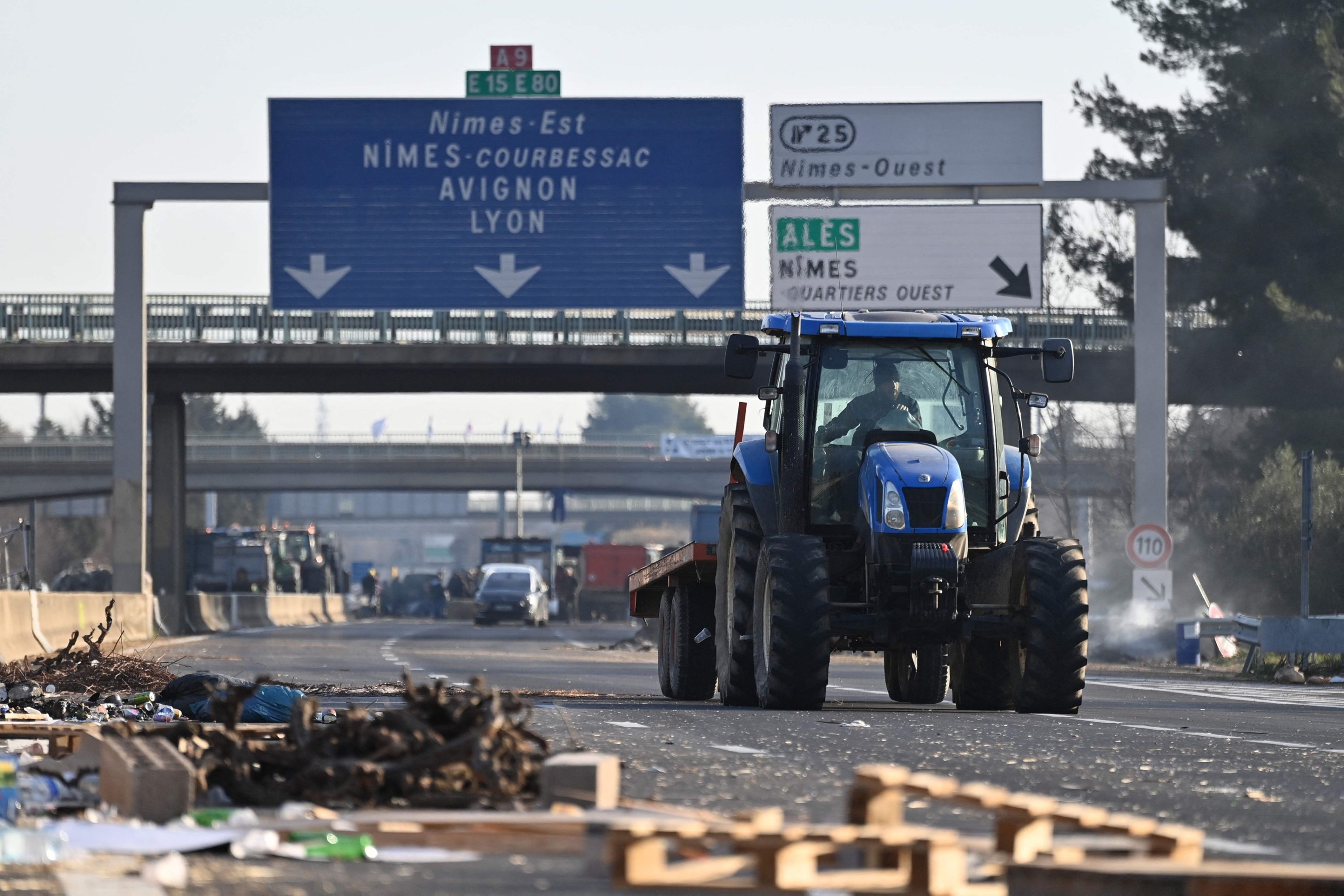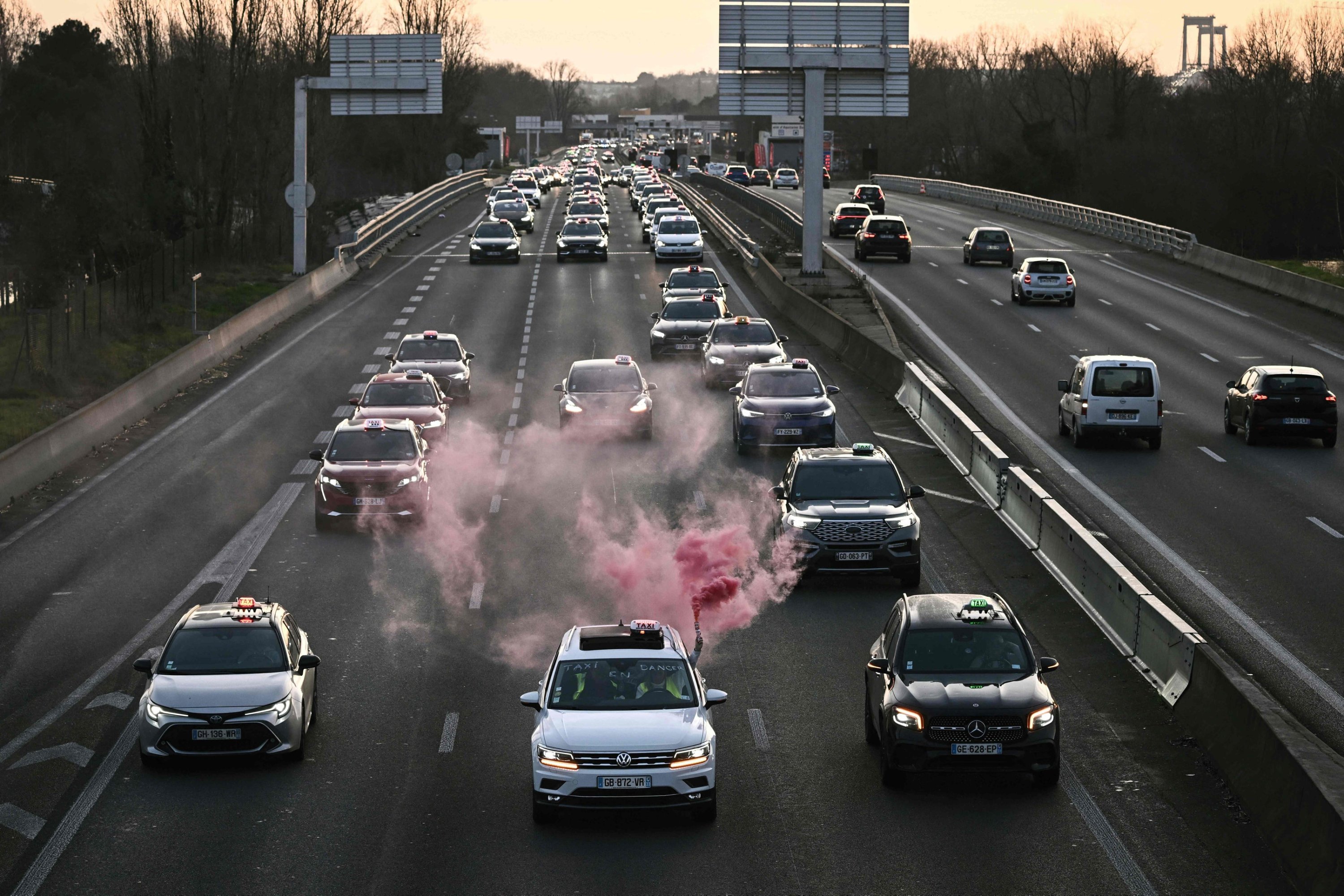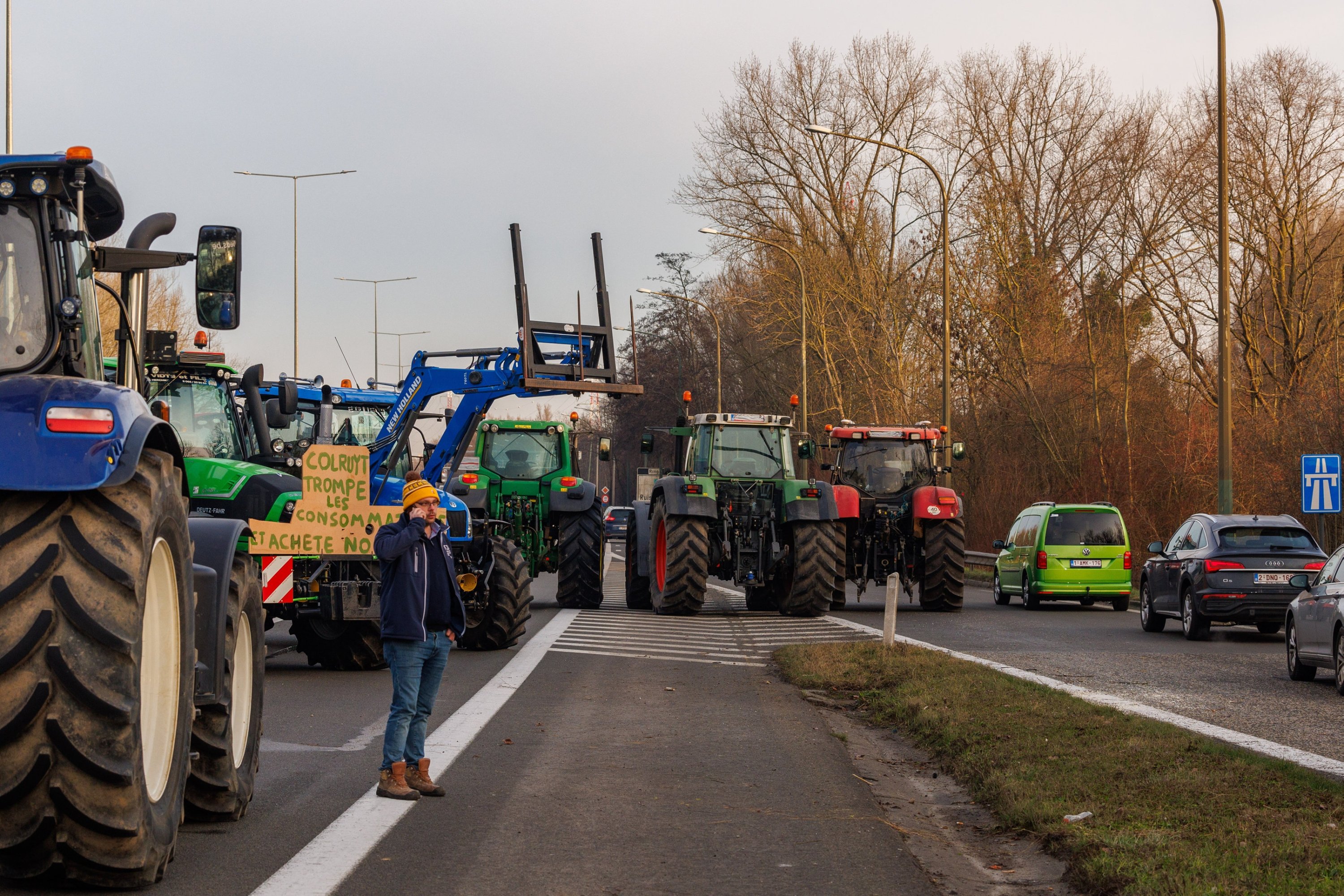© Turkuvaz Haberleşme ve Yayıncılık 2026
French farmers' nationwide protests intensified as they blocked highways across the country on Monday and said they aimed to "besiege" Paris, in a bid to press the government to do more to improve working conditions.
In recent weeks, there has been a slew of protests in the European Union's largest agriculture producing country, with farmers angered by insufficient income, red tape and environmental policies they say undermine their ability to compete with less stringent neighbors.
Protesting farmers began to block motorways at 2:00 pm (1300), starting with the A13 to the west of the capital, and the A4 to the east, Agence France-Presse (AFP) reporters said.
Farmers said their objective was to establish eight chokepoints on major roads into Paris.
"We need answers," said Karine Duc, a farmer in the southwestern Lot-et-Garonne department as she joined a convoy of tractors heading for Paris.
"This is the final battle for farming. It's a question of survival," she told AFP.
A banner on a tractor in the convoy said: "We will not die in silence."
President Emmanuel Macron will make a push for more pro-farming policies at a summit of EU leaders on Thursday, Farming Minister Marc Fesneau said.
The French government on Friday dropped plans to gradually reduce state subsidies on agricultural diesel and promised a reduction in red tape and an easing of environmental regulations, but farmers' organizations said that was not enough and pledged to step up the pressure.
Across France, farmers have used tractors and trucks to block roads and jam traffic.
The head of France's biggest farming organization said farmers would block all major highways out of Paris at about 30 kilometers (18 miles) from the center.
"What we have understood is that as long as the protest is far from Paris, the message is not getting through," Arnaud Rousseau, head of the FNSEA union, said on RTL radio.

Rousseau said farmers would continue their action everywhere in France "with the aim to get emergency measures about the core of our business."
Near Beauvais, north of Paris, dozens of tractors lined the highway, displaying banners that read: "I love my job but I would like to make a living from it" and "Our end will be your hunger" – a play on the similar sounding French words fin (end) and faim (hunger).
In Longvilliers, southwest of Paris, Reuters footage showed tractors blocking the A10 highway both towards and from the capital, with traffic diverted to smaller roads.
In response, the government ordered the deployment of 15,000 police and paramilitary gendarmes.
Interior Minister Gerald Darmanin told security forces to show restraint. But he also warned the farmers not to interfere with strategic spots.
"We don't intend to allow government buildings, or tax collection buildings, or grocery stores to be damaged or trucks transporting foreign produce to be stopped. Obviously, that is unacceptable," he said.
Darmanin said protests would not be allowed to affect operations at Paris's Charles de Gaulle and Orly airports, or at the Rungis international wholesale food market south of Paris where armored police vehicles were deployed Monday.
Armored police vehicles were deployed to Rungis on Monday after some farmers threatened to "occupy" it.
Police and gendarmes were also under orders to prevent any incursion into Paris itself, said Darmanin.
The government has been trying to keep discontent among farmers from spreading ahead of the European Parliament elections in June, seen as a key test for Macron's government.
During a visit to a farm on Sunday, Prime Minister Gabriel Attal scrambled again to address farmers' concerns, after a raft of concessions announced Friday failed to defuse the crisis.
"I want us to clarify things and see what extra measures we can take" to meet farmers' complaints that they face unfair competition, he said.
Fesenau said he would himself travel to Brussels this week in his bid to soften EU regulations regarding agricultural land that has to remain fallow under new green rules.
Asked when he wanted to reach an agreement with the European Commission on how to revisit the rules, Fesneau said "This week."
The EU's 2023 nature restoration law requires countries to introduce environmental measures on a fifth of their land and sea by 2030. To reach this goal, a chunk of around 4% of farmland has to remain fallow.
French farmers have complained this could hurt their businesses, and the government in Paris pledged to lobby on their behalf in Brussels.
Two EU officials told Reuters the EU's executive Commission was looking into changing the fallow land rule, as requested by France, among other options to respond to the farmers' concerns.
The Commission had already temporarily exempted farmers from the rule in response to the Ukraine war and food security concerns.
Rousseau said he was scheduled to meet Attal on Monday.
"Our target is not to annoy French people or to make their lives difficult, but to put pressure on the government," he noted.
Earlier, around 30 activists from the environmental group Greenpeace launched smoke grenades on Paris's Place de la Concorde near the Champs-Elysees.
They unfurled a banner in support of the farmers before being escorted away by police.
Some roadblocks had been lifted over the weekend, but tractor-driving farmers were back early Monday, gathering at assembly spots to drive on the capital.
On Sunday, two activists hurled soup at the glass protecting the Mona Lisa painting at the Louvre Museum to call attention to the agriculture industry.
"What is more important? Art or the right to healthy and sustainable food," the activists asked.
"Your agricultural system is sick. Our farmers are dying at work," they said.

Adding to the mayhem on French roads, taxi drivers staged their own protest movement on Monday against what they say is insufficient remuneration for the transport of patients by the French health services.
Their go-slow protests were beginning to choke off motorways across the country, including the A13 leading into Paris.
In Brussels too, traffic on the ring road around the Belgian capital was disrupted by angry farmers and about a dozen tractors had made it through to Square de Meeus in Brussels' EU area where they honked loudly.
Angry farmers stopped about five trucks with Spanish vegetables and dumped the produce near the distribution center of Belgian retailer Colruyt near Brussels, Belgian media reported.

The grievances of the Belgian farmers are similar to those of their French colleagues.
In recent weeks, similar farmers' protests have also mushroomed in Germany, Poland, Romania and the Netherlands.
